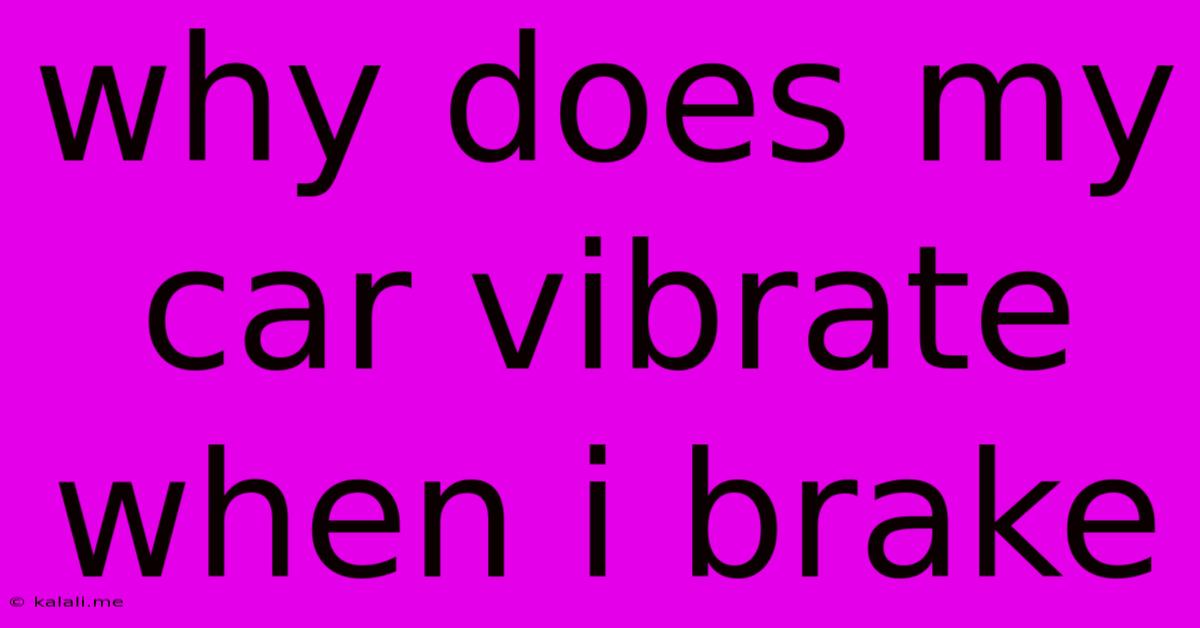Why Does My Car Vibrate When I Brake
Kalali
May 19, 2025 · 3 min read

Table of Contents
Why Does My Car Vibrate When I Brake? A Comprehensive Guide
Meta Description: Experiencing brake vibrations? This comprehensive guide explores the common causes of car vibrations when braking, from warped rotors to worn-out brake pads, helping you diagnose and fix the problem.
Brake vibration is a common automotive issue that can range from a minor annoyance to a serious safety concern. Feeling your steering wheel, brake pedal, or even the entire car shake when you brake indicates a problem that needs addressing. This article will explore the most common reasons why your car vibrates when you brake, offering insights into potential causes and solutions. Ignoring this issue can lead to further damage and potentially dangerous driving conditions.
Common Causes of Brake Vibration
Several factors can contribute to brake vibration. Understanding these causes is crucial for effective diagnosis and repair.
1. Warped Brake Rotors: This is arguably the most frequent culprit. Overheating, hard braking, or even corrosion can cause brake rotors to warp, resulting in a noticeable pulsing vibration in the steering wheel or brake pedal, especially at lower speeds. The uneven surface of the warped rotor causes inconsistent braking pressure.
2. Worn-Out Brake Pads: While worn brake pads themselves don't directly cause vibration, uneven wear can exacerbate existing problems like warped rotors or contribute to uneven braking force, leading to a shaky sensation. Regularly checking brake pad thickness is vital for preventing more significant issues.
3. Damaged or Loose Brake Components: Issues with calipers, brake lines, or other components within the braking system can lead to uneven brake pressure distribution. A sticking caliper, for example, can cause uneven wear on the brake pads and rotor, resulting in vibration. A loose component might create a rattle or vibration, especially during braking.
4. Wheel Bearing Problems: While not directly related to the braking system, damaged wheel bearings can contribute to vibrations felt during braking. A worn-out wheel bearing will introduce play into the wheel, making it wobble, and this wobble is amplified when braking.
Less Common Causes of Brake Vibration
While less frequent, some other factors can also cause vibrations during braking:
- Wheel imbalance or misalignment: Uneven tire wear, improperly balanced wheels, or misaligned wheels can lead to vibrations, which are often intensified during braking. A routine tire rotation and wheel alignment can usually fix these issues.
- Bent Wheel: A bent wheel, often caused by hitting a pothole or curb, can induce a vibration that becomes more pronounced while braking.
- ABS System Malfunction: Problems within the Anti-lock Braking System (ABS) can occasionally cause vibrations, but this is usually accompanied by other warning lights or unusual brake behavior.
- Contamination of Brake System: Dirt, rust particles, or other contaminants in the brake fluid can affect the system’s efficiency and cause vibration.
Diagnosing and Addressing the Problem
Pinpointing the exact cause requires careful inspection. While some minor issues might be addressed by a professional detailer (cleaning brakes), more significant problems demand a mechanic's expertise.
Things you can check yourself (with caution):
- Inspect your brake pads: Check the thickness of your brake pads. Uneven wear suggests potential problems with calipers or rotors.
- Visually examine your rotors: Look for any obvious warping, scoring, or rust damage.
Professional Diagnosis and Repair:
If you suspect warped rotors, worn-out pads, or more complex issues, it's best to consult a qualified mechanic. They possess the tools and expertise to diagnose the problem accurately and perform the necessary repairs, ensuring your safety and vehicle's optimal braking performance. They may suggest resurfacing or replacing rotors, changing brake pads, and addressing any other damaged brake components.
Ignoring brake vibration can lead to further damage, reduced braking efficiency, and potentially dangerous driving situations. Addressing the problem promptly is essential for maintaining vehicle safety and preventing costly repairs in the future.
Latest Posts
Latest Posts
-
Can You Square Root A Negative
May 19, 2025
-
Car Will Not Go Into Gear
May 19, 2025
-
How Much Do I Owe You
May 19, 2025
-
Where Is My Browser On My Phone
May 19, 2025
-
Do You Have To Say Check In Chess
May 19, 2025
Related Post
Thank you for visiting our website which covers about Why Does My Car Vibrate When I Brake . We hope the information provided has been useful to you. Feel free to contact us if you have any questions or need further assistance. See you next time and don't miss to bookmark.